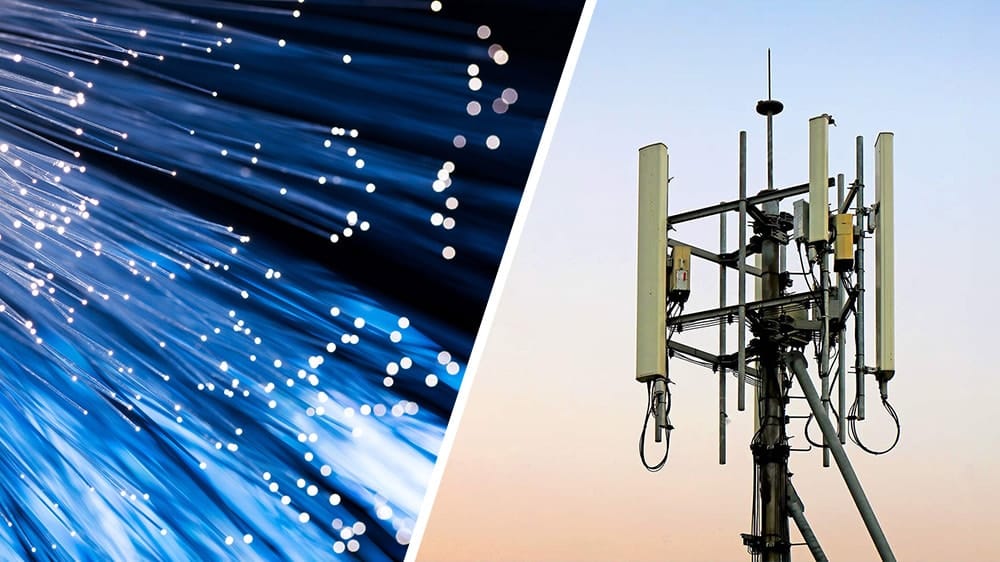
Choosing the right internet connection is crucial for staying connected in today’s digital world. Fiber optic and fixed wireless internet are two popular options, each with its own advantages. Understanding their differences can help you select the best service for your home or business.
Understanding Fiber Optic Internet
Fiber optic internet uses thin strands of glass or plastic fibers to transmit data as pulses of light. This technology offers ultra-fast speeds and reliable connections.
How Fiber Optic Internet Works
- Data Transmission: Information travels at the speed of light through optical fibers.
- Infrastructure: Requires physical cables installed underground or on poles.
- Bandwidth: Provides symmetrical upload and download speeds, often up to 1 Gbps or more.
Explore Our Fiber Internet Plans
Benefits of Fiber Internet
- Ultra-Fast Speeds: Ideal for streaming 4K videos, online gaming, and data-intensive tasks.
- Low Latency: Minimal delays, perfect for real-time applications like video conferencing.
- Reliability: Less susceptible to interference from weather or electromagnetic noise.
Considerations
- Availability: Primarily available in urban and suburban areas.
- Installation Time: Requires construction to lay cables, which can be time-consuming.
- Cost: Higher installation costs due to extensive infrastructure.
Understanding Fixed Wireless Internet
Fixed wireless internet delivers broadband service through radio signals from towers to a receiver installed in your home.
How Fixed Wireless Internet Works
- Data Transmission: Uses radio waves to send and receive data.
- Infrastructure: Requires a line of sight between the tower and your receiver.
- Bandwidth: Offers speeds comparable to DSL or cable, with some providers offering up to 100 Mbps or more.
According to research by Helmut Bolcskei from Stanford University, advancements in fixed broadband wireless access, especially below the 3 GHz band, have improved performance significantly by utilizing multiple antennas at both ends of the link.
Benefits of Fixed Wireless Internet
- Quick Installation: Installation can often be completed in days with no need for cables.
- Accessibility: Ideal for rural and underserved areas where laying fiber isn’t practical.
- Cost-Effective: Lower installation and maintenance costs compared to fiber.
Considerations
- Line of Sight: Physical obstructions like trees or buildings can affect signal quality.
- Weather Sensitivity: Extreme weather conditions may impact performance, although modern systems have improved resilience.
- Latency: Slightly higher latency than fiber but generally acceptable for most applications.
Speed Comparison: Fiber vs. Fixed Wireless
Fiber Optic Speeds
- Maximum Speed: Up to 10 Gbps in some areas.
- Symmetrical Speeds: Equal upload and download speeds.
- Ideal For: Data-intensive tasks, multiple users and businesses.
Fixed Wireless Speeds
- Maximum Speed: Typically up to 100 Mbps, depending on the provider.
- Asymmetrical Speeds: Upload speeds may be slower than download speeds.
- Ideal For: General browsing, streaming and remote work.
Reliability and Performance
Fiber Internet Reliability
- Consistent Performance: Not affected by weather or electromagnetic interference.
- Downtime: Less prone to outages but can be impacted by physical cable damage.
Fixed Wireless Reliability
- Stable Connection: Modern technology minimizes disruptions; the use of multiple antennas enhances performance.
- Downtime: Can be affected by severe weather or obstructions but generally offers reliable service.
Installation and Setup
Fiber Installation
- Time-Consuming: Involves laying fiber cables, which may require permits and construction work.
- Equipment Needed: An Optical Network Terminal (ONT) installed in your home.
Fixed Wireless Installation
- Quick Setup: Technicians install a small antenna or dish on your property.
- Equipment Needed: Receiver and modem; no digging required.
Cost Comparison
Fiber Internet Costs
- Installation Costs: Higher due to infrastructure and labor.
- Monthly Fees: Comparable to other high-speed internet services.
- Value: Superior performance is often worth the investment for those needing ultra-fast, reliable connections.
Fixed Wireless Costs
- Installation Costs: Lower, with minimal equipment required.
- Monthly Fees: Often more affordable than fiber.
- Value: Great for users needing reliable internet without the highest speeds.
View Our Internet Plans and Pricing
Security Considerations
Fiber Internet Security
- Secure Transmission: Difficult to tap into optical fibers without detection.
- Less Prone to Interception: A physical breach is required to compromise the network.
Fixed Wireless Security
- Encrypted Signals: Modern fixed wireless systems use robust encryption to protect data.
- Potential Risks: Wireless signals can be intercepted, but strong security measures mitigate this risk.
Which Is Better for You?
Choose Fiber If You:
- Require the fastest possible speeds.
- Need symmetrical upload and download speeds.
- Use data-intensive applications or have multiple users.
Choose Fixed Wireless If You:
- Live in a rural or underserved area.
- Need a quick and easy installation.
- Want a cost-effective solution with reliable speeds.
Frequently Asked Questions
Is Fixed Wireless Internet Good for Streaming and Gaming?
- Yes, fixed wireless internet can handle streaming and online gaming. With speeds up to 100 Mbps, you can stream HD videos and play games with minimal lag. The advancements in fixed wireless technology have significantly improved performance.
How Does Weather Affect Fixed Wireless Internet?
- Severe weather conditions like heavy rain or snow can impact signal strength. However, modern fixed wireless systems have evolved to minimize weather-related disruptions, ensuring a stable connection.
Can I Switch from Fixed Wireless to Fiber Easily?
- At Mercury Broadband, we make it simple to upgrade your service. If fiber becomes available in your area, we can transition your connection with minimal disruption.
Find the Plan that’s Right for You
- Both fiber and fixed wireless internet offer unique advantages. Fiber provides unmatched speed and reliability, while fixed wireless offers accessibility and quick installation, especially in rural areas.
- Mercury Broadband is committed to delivering high-quality internet services tailored to your needs. Whether you choose fiber or fixed wireless, we’re here to keep you connected.
